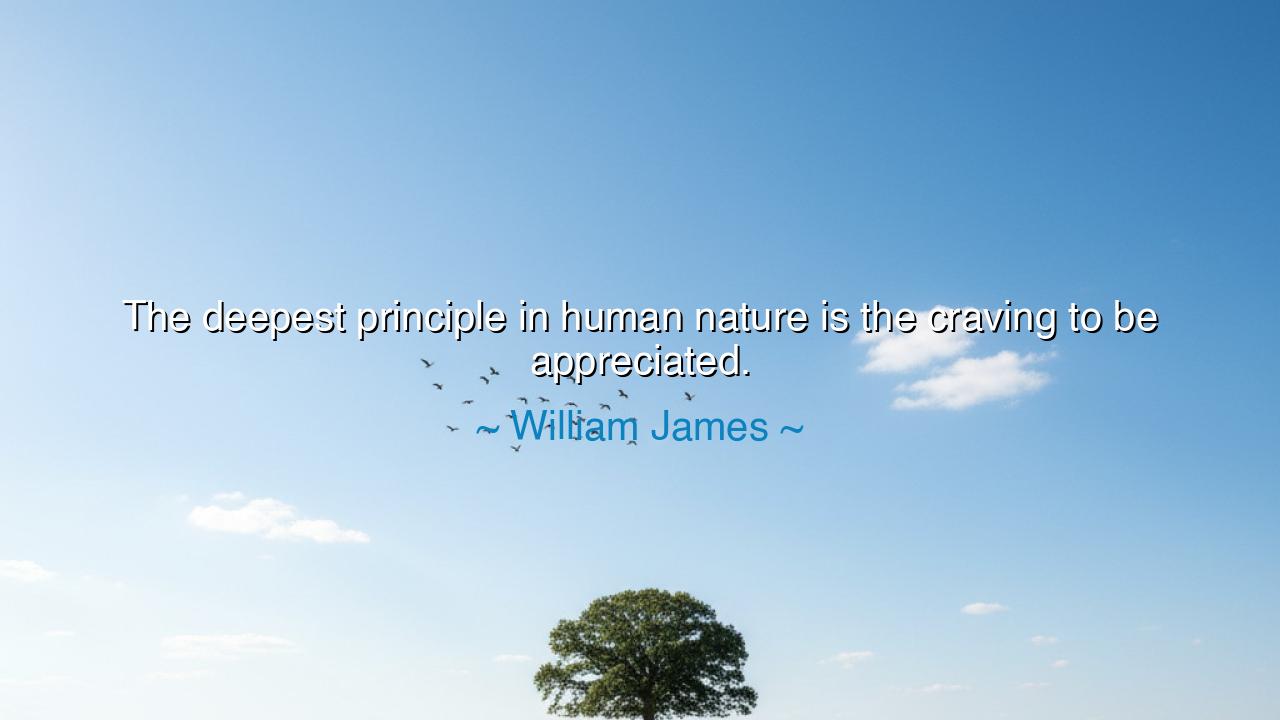
The deepest principle in human nature is the craving to be






Hearken, O seekers of wisdom and observers of the human soul, to the words of William James, who proclaimed: “The deepest principle in human nature is the craving to be appreciated.” In these words lies a meditation upon the innermost yearnings of the heart, the subtle force that drives both virtue and ambition, and the eternal truth that recognition, respect, and understanding are as essential to the spirit as sustenance is to the body. The ancients, who chronicled human behavior in parables and philosophy, recognized that the desire to be valued and esteemed shapes the actions, thoughts, and destinies of men and women alike.
James’ insight illuminates the fundamental human need for acknowledgment. From the lowliest villager to the most exalted ruler, the heart seeks assurance that its efforts, sacrifices, and character are seen and honored. This craving is not mere vanity, but a recognition that humans are social beings, bound by mutual perception and interaction. The ancients, from Aristotle to Confucius, taught that moral and social life is sustained by the recognition of merit and the honoring of contribution, for esteem cultivates virtue and fosters the bonds that hold communities together.
Consider the depth of the word “craving.” It is more than a desire; it is an essential force, an inner hunger that compels action, shapes conduct, and influences the choices of the soul. To be appreciated is to feel that one’s labor, integrity, and presence have meaning, that one’s contributions ripple beyond the self. The failure to be acknowledged can sap courage, diminish hope, and obscure the sense of purpose, whereas genuine recognition nourishes the spirit, emboldens action, and fosters the growth of character.
Historical examples illuminate this principle. Consider Florence Nightingale, who dedicated her life to the care of the sick during the Crimean War. Her tireless efforts might have gone unnoticed, yet acknowledgment—whether in the form of recognition from her peers, public admiration, or the gratitude of those she served—sustained her resolve. James’ insight reveals that the craving to be appreciated is not a weakness, but a vital sustenance that empowers extraordinary human action.
James’ reflection also carries moral instruction: to honor and appreciate others is to strengthen society itself. Recognition is a currency of virtue; it affirms effort, cultivates loyalty, and encourages the pursuit of excellence. The ancients understood this principle: leaders praised valorous citizens, teachers honored diligence, and communities celebrated the wise. To appreciate another is to nourish the spirit of the collective, to foster courage, and to uphold the bonds of social and ethical life.
O listener, perceive the lesson here: the desire to be appreciated is universal and fundamental. To deny it in oneself or others is to ignore a force that shapes action, loyalty, and virtue. To fulfill it, even in small ways, is to empower growth, cultivate confidence, and affirm the dignity of every human being. The recognition of effort and character is not mere kindness—it is a vital sustenance of the soul.
Practical guidance flows naturally from this meditation. Offer genuine appreciation to those around you—friends, family, colleagues, and strangers alike. Acknowledge effort, honor integrity, and celebrate achievement. Reflect upon your own craving for recognition, and channel it toward purposeful action, understanding that the desire to be seen and valued is a force that can propel you toward virtue, learning, and greatness.
Thus, O seeker, engrave this wisdom upon your spirit: the deepest principle in human nature is the yearning to be appreciated. William James’ words remind us that recognition is both a gift and a sustenance: it nourishes courage, strengthens character, and binds communities. Honor others, value yourself, and let the light of genuine acknowledgment guide the hearts of men and women toward courage, virtue, and enduring fulfillment.






AAdministratorAdministrator
Welcome, honored guests. Please leave a comment, we will respond soon